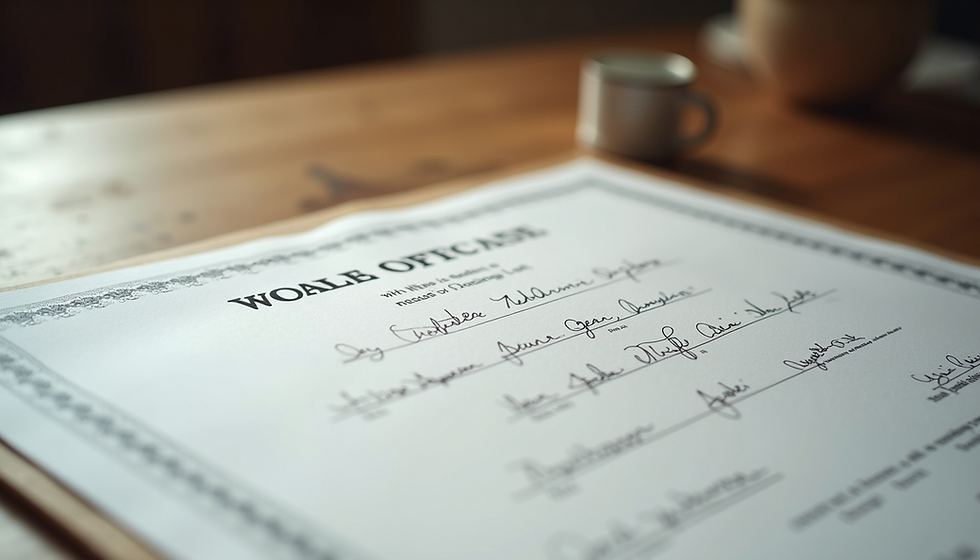Marriage Witness Rules You Should Know
- Krystle Moore

- Jun 23, 2025
- 4 min read
When planning a wedding, one of the essential yet often overlooked aspects is the role of the marriage witness. Understanding the rules and requirements can make your big day smoother and more legal. In this blog post, we will explore the key points you need to know about marriage witnesses, from their responsibilities to the specific rules that differ by state or country.
What is a Marriage Witness?
A marriage witness is a person who signs the marriage certificate confirming that they witnessed the marriage ceremony. This role is more than just a formality; it provides a legal confirmation of the marriage. Witnesses are crucial in many jurisdictions, as they validate the marriage and ensure that all legal requirements have been met.
Requirements for a Marriage Witness
The requirements for a marriage witness can vary significantly depending on your location. Generally, witnesses must be of legal age, which is usually at least 18 years old. Some jurisdictions allow minors to serve as witnesses, but this often requires additional documentation or parental consent.
For example, in most states in the United States, two witnesses are required to sign the marriage license. However, in some places like Massachusetts, one witness may be sufficient. It’s critical to check the local laws applicable to your wedding to ensure compliance.

Different cultures may also have specific witness obligations. In some traditions, a family member may be expected to fulfill this role, emphasizing the importance of family in the ceremony.
What are the Responsibilities of a Marriage Witness?
The primary responsibility of a marriage witness is to be present during the wedding ceremony and to sign the marriage license afterward. This act confirms that the marriage took place as intended. Witnesses should be reliable individuals who can provide these confirmations.
In addition to signing the license, some jurisdictions may require witnesses to provide identification. This step is necessary to validate their presence and confirm their qualification to act as a witness.

Moreover, choosing a proper witness enhances the emotional significance of the day. A good witness can provide support during the ceremony, helping to alleviate nerves and create a joyful atmosphere.
Choosing Your Marriage Witnesses
When it comes to selecting a witness, consider individuals who are meaningful to you. Friends or family members usually make great choices, but ultimately, it’s up to the couple. Here are a few tips to help you decide:
Consider Their Relationship with You: Opt for someone who knows you and your partner well. Their connection to you can enhance the occasion's intimacy.
Legal Availability: Ensure the person you choose is available on your wedding date and meets the legal requirements for a witness in your area.
Comfort Level: Pick someone comfortable with being in a public setting and can reflect on the importance of the moment. They should be genuinely happy for you and your partner.
By understanding the criteria for selecting a witness, you can better personalize your wedding experience.
What Happens if the Witness Cannot Attend?
Sometimes, unforeseen circumstances can cause a witness to be unavailable. If this happens, most jurisdictions allow you to appoint a substitute witness, provided they meet the legal requirements. It’s a good practice to have a backup witness in place if possible.
Consider having an open conversation with your potential witnesses ahead of time. This open dialogue will avoid last-minute chaos and make navigating any changes smoother.

If you find yourself in a situation where you cannot secure witnesses before the ceremony, it is advisable to consult the local marriage authorities. They can provide guidance on how to handle the situation effectively and avoid complications.
Additional Tips for a Smooth Wedding Ceremony
Planning the wedding ceremony can be stressful, but a few practical tips can help relieve some of that pressure. Here are some actionable recommendations:
Communicate Clearly: Make sure to clearly communicate with your witnesses well in advance. Discuss the schedule, timing, and their role in the ceremony. This clarity will ease any confusion on the big day.
Provide Identification Ahead of Time: If your jurisdiction requires identification, remind your witnesses to bring the necessary documents to prevent any last-minute issues.
Consider Hiring Officiants Familiar with Local Laws: Officiants often have experience with local marriage laws. Engaging their services can ensure that everything stays compliant and runs smoothly.
Practice the Signing Process: Before the wedding day, consider a quick run-through of how and when your witnesses will sign the marriage license after the ceremony. This familiarity can reduce stress and interruptions.
These simple steps can make a big difference in ensuring that your wedding day flows seamlessly.
Final Thoughts
Understanding the witness requirements for marriage is essential not only for legal reasons but also for the meaningfulness of your wedding. Choosing the right individuals, ensuring they meet the criteria, and making sure they are comfortable and involved can greatly enhance your ceremony.
As you plan your wedding, take the time to consider who will stand by you as a witness. Choose someone who adds to your joy and make your special day even more memorable. Don’t hesitate to contact local marriage authorities for any specific questions or concerns you may have about witnessing rules in your area.
By staying informed, you can ensure a smooth and joyous celebration of love. Happy wedding planning!



Comments